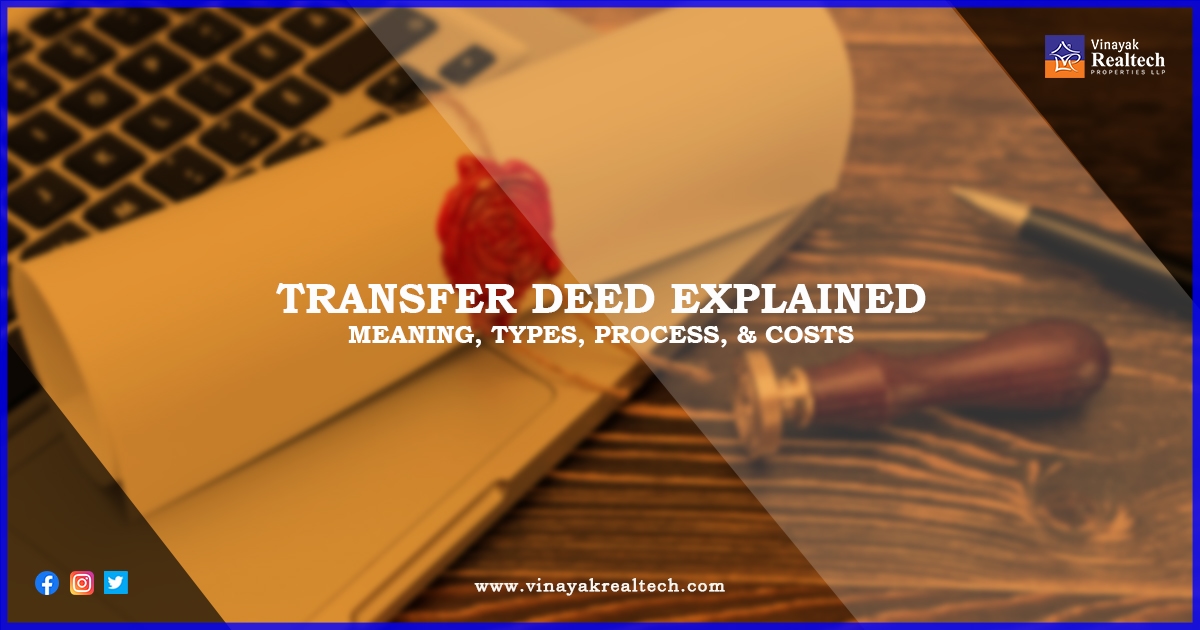Transfer Deed Explained: Meaning, Types, Process, & Costs
Gifting or inheriting a property is a common thing in the real estate world. However, if you wish to gift or transfer ownership to someone, it is not as simple as handing over the keys. You must keep it in writing to maintain transparency and legalities. Are you surprised about how to do it? Read this blog to know everything about the Transfer Deed.
What is a Transfer Deed?
To transfer ownership of a property, you must sign a transfer deed. A transfer deed is a legal document that legalises the transfer of property ownership from one person to another. If you are the owner, through a transfer deed, you can transfer the ownership to an individual, a group of people or a company.
This property transfer can be done in exchange for money or, as a gift to someone. A transfer deed in India is often named as a conveyance or an assignment. It is governed by the Transfer of Property Act of 1882.
As an owner, you need a property deed for this transfer deed and transfer the ownership of an immovable, real estate asset like land or a house. Note that it must not be confused with a share transfer deed, which is used to transfer the ownership of company shares. The transfer deed is only used.
- To sell a house or land
- Gifting a property to someone
- Dividing a property among heirs or others
What are the Types of Transfer Deed?
The real estate industry has a lot of red tape, and to adhere to the legalities, you must follow them. In this industry, you must be very specific about the intention.
There are various transfer deed types (gift deeds, relinquishment deeds, etc). These types help an owner and buyer or heir to specify the true intention of this transfer.
Gift Deed
As the name suggests, a gift deed is used when you transfer property ownership without accepting a price (as a gift). For example, a father is gifting property to his kids. In that case, the father must use a gift deed as a transfer deed to legalise the process.
Relinquishment Deed
The relinquishment deed is commonly used in family settlements. For instance, the property owner has died without making a legal will. The property owner has two inherits, and one of them wants to give up on the ownership. They can use the relinquishment deed to transfer the ownership to another.
Partition Deed
A partition deed is another type of transfer deed that is used for family settlement. It is designed to be used for resolving disputes over property among siblings. For example, two brothers jointly own land, and after the property division, they want to record who owns which part of the land. For this, the partition deed is used. This deed includes a formal agreement, a clear definition of ownership, and legal protection. It helps simplify inheritance and contributes to avoiding legal feuds.
Quick Deed Transfer
Quick-deed transfer is one of the fastest processes of transferring ownership. Although it is rare in India, sometimes it gets used in families for transfer or low-value transfers. It is handy in family transfers and the correction of title issues. For instance, a man transfers a small plot of land to his cousin to settle an old family agreement using a quick deed transfer process.
How can You Process a Transfer Deed in India?
Following the right process in the real estate industry controls the success rate of the work. Likewise, opting for the ideal way to get a transfer deed is crucial to executing the deal while maintaining the legalities.
Due Diligence
The process of using a transfer deed starts with due diligence, and this step is crucial. The due diligence process includes verifying the property’s ownership, title history, any encumbrances, and the legality of the construction. To ensure 100% legality, always hire a lawyer. The lawyer will scrutinise all the relevant documents, such as the sale deed, title deed, encumbrance certificate, building approvals, and property tax receipts on your behalf.
Sell Agreement
After due diligence, you can proceed with the sales agreement. The selling agreement outlines the terms and conditions of the sale, including the sale consideration, payment schedule, possession date, and any other relevant clauses. It is important that the selling agreement gets drafted with all the legal bindings and gets signed by both parties in the sub-register office in the presence of witnesses.
Sale Deed
After signing the selling agreement, it is time to jump on the sale deed. A sale deed is a legal document that ensures the transfer of ownership. The document includes details such as the property description, sale consideration, rights and obligations of both parties, and other necessary clauses.
Payment of Stamp Duty and Registration
The stamp duty and registration fees are mandatory taxes in the real estate industry. The stamp duty is based on the property’s market value or the sale consideration, whichever is higher. Note that the state governments of India collect these taxes; hence, they vary in every state. Stamp duty in West Bengal is 3% to 4% in rural areas and 4% to 5% in urban areas, depending on the property value. The registration fee is 1% across all locations.
Handover and Possession
You have almost fulfilled all the legalities, and it is time for the property handover and possession. The seller must hand over the property as per the pre-decided possession date.
Mutation and Update of Records
The possession date means the buyer can start living or using the property from that day. However, the legalities do not end here. After possession, the buyer or receiver must go for mutation. It is conducted in the local panchayat, municipal, or corporation office. The buyer should submit the necessary documents, updated property tax receipts, and identity proofs, to complete the mutation process.
Documents Required for Transfer of Property
In the real estate industry, you must prepare all the documents before starting the procedure to save time and hassle.
- The Aadhaar card of the seller and the buyer
- Passport photos of the seller and the buyer
- Original copy of the previous sale deed
- No Objection Certificate for Land Ceiling Act
- Latest property registration document
- A recent copy of the municipal tax bill
- Construction/building completion certificate
- The original agreement between the builder and the first buyer
Final Thoughts:
Whether it is a gift, sale, or inheritance, the transfer deed is the best way to ensure 100% legality of the property. Evaluate the type of transfer deed you need and follow the right process.
For any other property-related guidance or a lush property in the middle of Kolkata, connect with us. At Vinayal Realtech, we emphasise honesty, transparency and client satisfaction. We take pride in delivering top-notch real estate properties at the most competitive price range.













